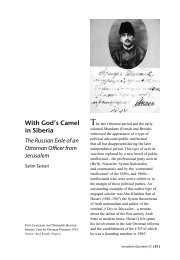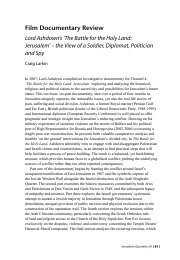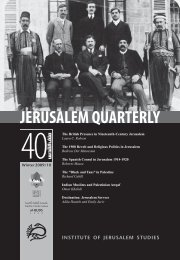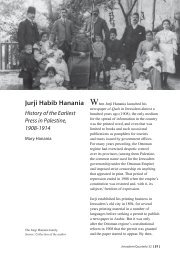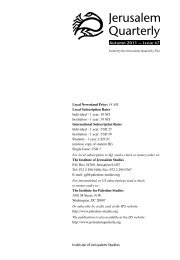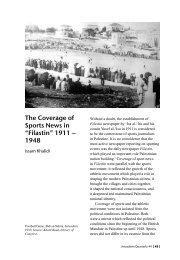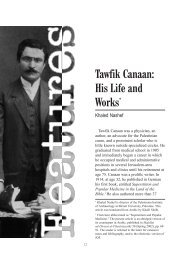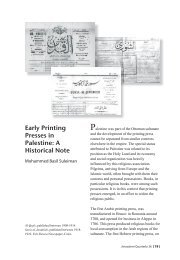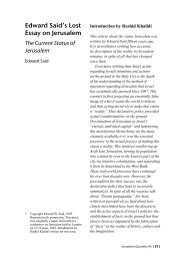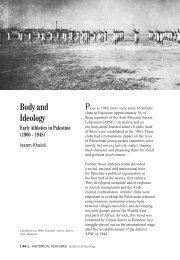PLUNDERING PALESTINE - Jerusalem Quarterly
PLUNDERING PALESTINE - Jerusalem Quarterly
PLUNDERING PALESTINE - Jerusalem Quarterly
You also want an ePaper? Increase the reach of your titles
YUMPU automatically turns print PDFs into web optimized ePapers that Google loves.
Until the very end of the Mandate government, the importance of protecting cultural<br />
heritage is demonstrated by on-going investigations into reports of illegal antiquities<br />
smuggling. These thriving smuggling networks established during the Ottoman and<br />
Mandate periods continue to operate in the present, according to recent oral histories.<br />
When questioned about the origin of the material for sale in shops, many dealers<br />
corroborated the documents in the archival material. The complex smuggling<br />
networks established in Jordan, Lebanon, Israel, Palestine, and Syria are still in use.<br />
Artefacts are crossing the borders in diplomatic pouches and UN trucks and aid<br />
vehicles (Archaeologist 37 and government employee 43). Dealers (1, 2, 32, 46, 57,<br />
and 68) and looters (12, 15) in Israel, Palestine and Jordan confirmed that diplomats<br />
purchasing archaeological material often stated that “they had no need for an export<br />
license or any other type of legal document as the material was going home in a<br />
pouch.” 50 Just as Mr. Rosh used his position within the Mandate government to move<br />
archaeological material with ease, so do diplomats posted today in Israel, Jordan and<br />
Palestine.<br />
The examination of the British Mandate DOA archival material provides some record<br />
of the day-to-day management of the trade, the illegal and legal elements of the trade,<br />
the monitoring of regional and international movement of archaeological material, and<br />
use of diplomatic status to facilitate that movement. These characteristics outlined in<br />
the archival records act as harbingers of potential problems, drawbacks and successes<br />
associated with the legal marketplace. Theoretically, this evidence would have been<br />
(and still is) available to the drafters of the relevant cultural heritage protection<br />
legislation in Israel and Palestine and may have aided in determining which articles<br />
of AO 1929 and AR 1930 to retain and which to omit from future legislative efforts.<br />
Additionally, the archival evidence sets the stage for substantiated problems with the<br />
legal market, illuminating the weaknesses in the legislative legacies that are carried<br />
on until today in the laws of Israel, Jordan and Palestine. Interviews conducted with<br />
the various stakeholders in the trade in antiquities (archaeologists, collectors, dealers,<br />
government employees, looters, and tourists) in Jordan, Israel and Palestine confirm<br />
that many of the flaws in the licensed trade cited in the archival material exist today.<br />
Who Owns the Past? Should There be a Trade?<br />
The demand for archaeological artefacts from Palestine has existed for centuries.<br />
In order to meet that demand, a flourishing trade in relics was established and<br />
maintained. Historical precedence, legislative legacies and current governmental<br />
efforts would suggest that the majority of the region’s inhabitants supported and still<br />
do support a legal trade in antiquities, but is this really the case?<br />
<strong>Jerusalem</strong> <strong>Quarterly</strong> 33 [ 35 ]


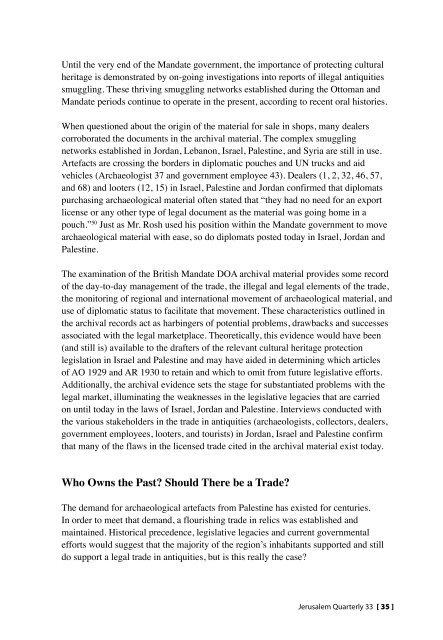
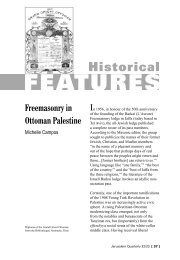
![In Search of Jerusalem Airport [pdf] - Jerusalem Quarterly](https://img.yumpu.com/49007736/1/180x260/in-search-of-jerusalem-airport-pdf-jerusalem-quarterly.jpg?quality=85)

